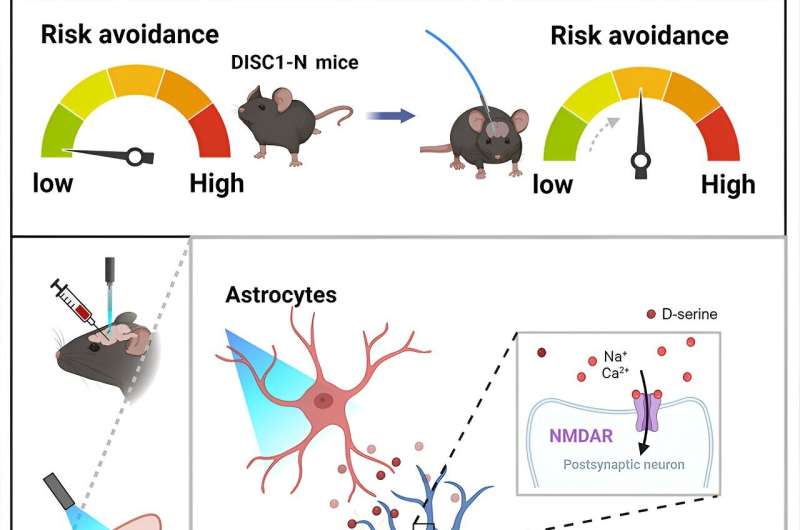This article has been reviewed according to Science X's editorial process and policies. Editors have highlighted the following attributes while ensuring the content's credibility:
fact-checked
peer-reviewed publication
trusted source
proofread
Researchers unveil vital role of astrocytes in mental health

Astrocytes, as vital cells in the central nervous system, are crucial for brain health and function. Recent research shows that they influence higher cognitive functions and behaviors by regulating local neuronal activity.
During stress, animals and humans assess risks to generate adaptive behaviors like avoidance. Mental disorders often disrupt this process, leading to excessive risk aversion (e.g., anxiety, depression, and autism) or insufficient risk avoidance (e.g., substance abuse, and schizophrenia).
However, the neural basis of these disruptions is not fully understood. While the basolateral amygdala (BLA) is known for active avoidance, its specific regulatory role in risk assessment and subsequent behaviors remains unclear.
Recently, Prof. Tu Jie's team at the Shenzhen Institute of Advanced Technology (SIAT) of the Chinese Academy of Sciences conducted a study on astrocytes in the BLA to investigate their roles in regulating impaired risk assessment in mental disorders. The findings were published in Neuron.
In previous work, researchers utilized a unique transgenic mouse model, DISC1-N mutant transgenic mice, to uncover impaired avoidance responses in these mice when confronted with threats.
In this study, researchers employed single-nucleus RNA sequencing in conjunction with patch-clamp and real-time quantitative single-cell PCR techniques to identify a specific group of glutamatergic excitatory neurons expressing Wolfram syndrome 1 (WFS1) in the BLA. These neurons received induced action potentials from nearby astrocytes. In DISC1-N mice, these neurons exhibited reduced firing capabilities and impaired interaction with astrocytes.
By activating astrocytes in the BLA using optogenetics/chemogenetics methods and through D-serine's action on the N-methyl-D-aspartic acid (NMDA) receptors of BLA-WFS1 neurons, researchers found that the excitability of these neurons can be restored, thereby improving abnormal risk assessment behavior in DISC1-N mice. They also observed that direct activation of BLA-WFS1 does not effectively correct the deficient risk avoidance behavior in DISC1-N mice.
After seven years of hard work, researchers confirmed that specific neurons in the BLA require interaction with astrocytes to perform normal risk assessment, which highlights the insufficiency of autonomous neuronal activity alone in carrying out relevant risk-assessment functions. Moreover, they revealed the disruption in astrocyte-neuron communication as a crucial mechanism contributing to deficits in risk- assessment.
"Our study offers evidence of the critical role of astrocytes in regulating behavior, and presents novel therapeutic targets for addressing impairments in risk assessment function within mental disorders," said Prof. Tu.
More information: Xinyi Zhou et al, Astrocyte-mediated regulation of BLAWFS1 neurons alleviates risk-assessment deficits in DISC1-N mice, Neuron (2024). DOI: 10.1016/j.neuron.2024.03.028



















